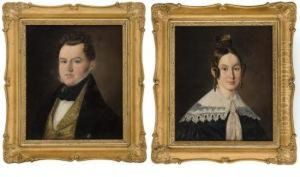Jakob Munch Paintings
Jakob Munch, not to be confused with his more famous relative, the Norwegian painter Edvard Munch, was a historical figure in his own right, albeit not as an artist. Born in 1776 in Kristiansand, Norway, Jakob Munch was not primarily known for his contributions to the arts, but rather for his work in the field of theology.
Jakob Munch was a theologian and educator who spent a significant portion of his life engaged in religious and academic pursuits. He was a part of the Danish-Norwegian cultural sphere, a region that, during his lifetime, was undergoing various social and intellectual changes, including the early movements of National Romanticism, which would later influence artists like Edvard Munch.
Throughout his career, Jakob Munch was involved in the education sector, where he worked to influence and teach future generations. His role as an educator was particularly important in a time when access to education and scholarly thought was becoming increasingly significant in shaping the cultural and intellectual landscape of Norway.
Despite sharing the same last name, Jakob Munch's legacy is not in the realm of painting or fine arts. His death in 1839 marked the end of his contributions to the theological and educational fields in Norway. The Munch family name would later gain international recognition through the expressionist works of Edvard Munch, particularly 'The Scream,' which encapsulated human anxiety and emotion in a way that resonated with the existential experience of the late 19th and early 20th centuries.
It is important to clarify that while Jakob Munch may have made contributions to his respective fields, he remains a relatively obscure figure and does not hold a significant place in art history. His contributions are overshadowed by the later achievements of Edvard Munch in the world of art. Thus, detailed biographical information specifically about Jakob Munch's life and work is limited, and he is often remembered, if at all, in the context of his relationship to the famous painter.
